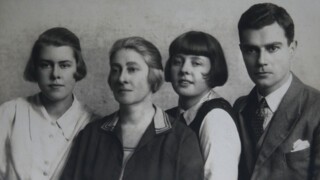Incredible Untrue Events
Jeremy Bernstein
Trevor Nunn’s movie Red Joan, starring Sophie Cookson and Judi Dench, claims to be ‘based on incredible true events’, namely the life of Melita Norwood. But the story told by the film is so far from the truth it’s nonsense.
Melita Sirnis was born on 25March 1912 in the Bournemouth suburb of Pokesdown. Her parents were active socialists; her father ran a weekly paper called the Southern Worker and Labour and Socialist Journal. He died when Melita was six. After leaving grammar school she studied Latin and logic at Southampton for a year, then moved to London and became a secretary at the British Non-Ferrous Metals Research Association in 1932. In 1935 she married a chemistry teacher of Russian origin, Hilary Norwood, who had changed his name from Nussbaum. She joined the Party in 1936 and remained a communist for the rest of her life.
During the war the BNFMRA did research into how to make the metal in ships less susceptible to corrosion but none of its work then or after was classified. As Phillip Knightley revealed in the New Statesman in 1999, Norwood took a leave of absence between 1943 and 1946 to have a child. This makes it even more absurd to suggest that she gave the Russians documents that were relevant to nuclear weapons or indeed much of anything else. She was exposed in the 1990s but the government decided there was no point pursuing the matter.
In the film, Joan Stanley is studing physics at Cambridge when she’s recruited for Tube Alloys, the British nuclear weapons programme. At one point she explains to several of her gobsmacked colleagues that centrifuges can be used in the separation of isotopes. It’s true that researchers at Cambridge, including Paul Dirac, investigated the use of gas centrifuges for enriching uranium but the experiments were eventually dropped and Norwood had nothing to do with them. (If the filmmakers wanted to make a movie based on the life of a female nuclear physicist, why not go for someone like Lise Meitner, who discovered uranium fission in the 1930s alongside Otto Hahn? He won the 1944 Nobel Prize in Chemistry for their work; she lost her job at the Kaiser Wilhelm Institute under the antisemitic Nuremburg Laws and fled to Sweden in 1938. She retired to England in 1960 and would make a good role for Judi Dench.)
Meanwhile Joan has some dramatic love affairs. Eventually she marries one of her suitors and has a son, a barrister, who defends her in court after repeatedly denouncing her for her unpatriotic behaviour.
When Norwood admitted to having been a KGB agent (codename HOLA), former colleagues were bewildered at her confession. ‘Our progamme wasn’t secret,’ one of them has written to me. ‘Our programme for the nuclear energy industry was concerned with power generation, not weapons and mostly on fringe subjects, so I wonder what Norwood has confessed to, or thinks she has confessed to.’
In the film, Joan is an associate of the head of Tube Alloys. In real life, Norwood was (until 1943) the secretary to G.L. Bailey, the head of a department at BNFRA who was on an advisory committee to Tube Alloys. But he had been warned about Norwood’s political associations and was careful not to reveal anything to her. It is likely that when she informed whatever KGB contacts she had that she had some association with nuclear energy they immediately thought ‘bomb’. Norwood herself probably had no understanding of what she was turning over. She died in 2005 at the age of 93.


Comments
-
11 May 2019
at
7:39pm
Jim Macfarlane
says:
"Melita Sirnis was born on 25 March 1912 in the Bournemouth suburb of Pokesdown. Her parents were active socialists; her father ran a weekly paper that he distributed to the Communist Party of Great Britain. He died when Melita was six."
-
11 May 2019
at
8:12pm
Thomas Jones (blog editor)
says:
@
Jim Macfarlane
Very good point. Sentence now emended.
-
12 May 2019
at
1:25am
Bob Beck
says:
If the movie doesn't purport to be a biopic -- if it changes such basic data as Sirnis's name and education -- then I don't see what the fuss is about, or why one would get exercised about bog-standard showbiz hype on the order of "based on a true story."
-
12 May 2019
at
12:25pm
Jeremy Bernstein
says:
I take Mr.Beck's comment but I ask what would he think of a film about Napoleon where Napoleon spoke only Swedish. That is how I felt about this film.When she "explains" to the awe struck physicists at Tube Alloys how to use centrifugal force to separate isotopes and they look at her as if they are thunderstruck by the idea when I know that this method is as old as the discovery of isotopes it hard for me to take anything seriously in the film. I can tell you that the audience in the theater where I saw it did seem moved.
-
12 May 2019
at
3:43pm
Bob Beck
says:
@
Jeremy Bernstein
I can sympathize with that sort of criticism, at least. Movies in which people talk, say, of groundwater typically flowing in "underground rivers" make me roll my eyes.
-
12 May 2019
at
4:41pm
Jeremy Bernstein
says:
Stanley Kubrick was scrupulous about getting things scientifically right for 2001. He grilled me extensively about whether there could be space travel at speed greater than light. I explained to him about relativity. He grilled Marvin Minsky extensively about robotic arms. It would not have diminished the story of Red Joan if the people involved had spent ten minutes getting the facts right.Indeed I think the story would have been enhanced if as in real life Joan had no idea what she was stealing.
Read moreThis doesn't add up. The CPGB wasn't founded until 1920.
Why movie promoters think such talk makes their product more compelling, I don't know, but so they seem to. Personally, I'd be more interested in whether the movie's any good -- well-written, -acted and so on.
Another word for "nonsense," in this context, would simply be "fiction."
Scriptwriters can, if they're good, present technical information in ways both reasonably accurate, and reasonably comprehensible to general audiences. But if, in this case, they couldn't find a way, or didn't bother, then I too might get impatient with (otherwise forgivable, even trivial) liberties like having the main character handle classified material, where her real-life model didn't.
Which is not, I continue to feel, the same sort of liberty as having Napoleon speak only Swedish (or indeed speak Swedish at all).